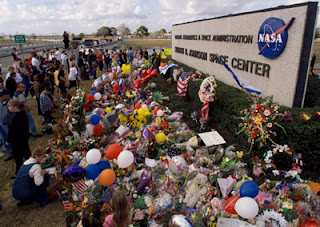The Second Space Shuttle Tragedy
 |
| Spontaneous Columbia memorial, courtesy of NASA |
On the television screen was an image of clear blue sky with a cluster of white streaks. It was the Space Shuttle. "Oh, shit," I said. "It broke up. They're dead." I had seen something like it seventeen years ago, when the Space Shuttle Challenger exploded during its ascent.
Once the investigation was over, I put the blame for Challenger where the facts pointed, on managerial arrogance at Morton Thiokol and NASA. This time, it appears to be a different form of managerial incompetence, one more deeply ingrained in the human condition, expressed in the bromide, "When you're up to your ass in alligators, it's hard to remember that your original objective was to drain the swamp." Under the pressure of dealing with day-to-day difficulties, things that are not critical to be solved this very day — things that can wait because they've waited until now — wait indefinitely. All of us who manage must let things slide in order to keep up with the stuff we know is critical. In this case, the list of safety upgrades to Shuttle technology may have slid too long. Time and investigation will tell.
I say these things, not to start a hunt for scapegoats — there are likely to be none this time — but to direct the attention of my fellow believers in the Abrahamic religions (Judaism, Christianity, and Islam) to look to the Human Condition, rather than to Divine Judgement. In particular, I think of the Iraqi official who claimed that the accident was God's Judgement against Israel and the United States. By that same logic, one could attribute the decline of the Arab Islamic world with respect to the West since 1400 (as described by Bernard Lewis in his book What Went Wrong) to God's Judgement against Muslims. As I assume the official in question would hesitate to do that, I consider that he should hesitate to declare God's Judgement concerning the Columbia.
But now we must turn to the human cost paid by the Columbia's crew — Rick Husband, William McCool, Michael Anderson, Kalpana Chawla, David M. Brown, Laurel Blair Salton Clark, and Ilan Roman — and their families and friends. Their loss is the incalculable loss of seven worlds that might have been. Worlds that they all very much wanted. May God comfort the survivors according to their needs, and bring them in time to experience healing of their grief.
This human cost is also felt by the whole People of the United States, and by the peoples of India and Israel. The media will ask, is manned space flight worth the risk? Is it worth the money? Let me start with the second to answer the first.
Manned space flight has not been economically worthwhile since it began, and will not be economically worthwhile for the foreseeable future. We are not in it for the money.
Manned space flight has never yielded any scientific knowledge that could not have been gained by unmanned flight (other than the response of the human body to long-term weightlessness), nor is it likely to do so for a very long time. We are not in it for the science.
What manned space flight has yielded, is astonishing advances in engineering and engineering management — the twin arts/sciences/diciplines/practices of making and using things that work. But we are not in it for the engineering. We aren't in it even for the prestige — its no longer new enough to astonish the world with each marginal advance.
We are in manned space flight for just one thing — the adventure. If we turn away from that adventure, we turn away from a future as grand as the Universe to a smaller destiny sandwiched between the top of the atmosphere and the bottom of the sea. Never mind that we will tie the fate of humanity to the fate of one small, vulnerable planet — I'm thinking much shorter term than that.
If we turn away from manned space flight we will diminish our culture here and now. We will slip from a culture of boundless optimism to a culture of limits. We will achieve less, because we will attempt less. We will begin to stagnate. What the astronauts bought for us with their courage was Hope in this world.
Manned space flight is not worth doing in itself. It is worth doing because it helps make all the other things worth doing. Let us honor the courage, the drive, the spirit, and the sacrifice of Columbia's crew by doing what they would have us do — let us continue.
And some day, we will find a way up from earth's gravity well, and a way to fly through space, that will take us to the stars.
Editor's Note: The discipline required to do complex and dangerous things safely is practiced by High Reliability Organizations. NASA appears not to be one of them.
No comments:
Post a Comment